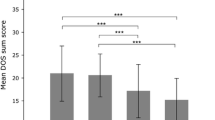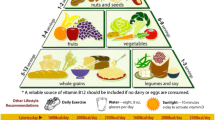Abstract
Background
The number of individuals following a vegetarian diet has increased in the last 50 years. Although the causal connection between orthorexic behaviors and vegetarianism remains widely assumed, evidence in support of this assumption has been largely inconsistent.
Objective
The purpose of the study was to conduct a review of the relationship between vegetarian diet and orthorexic eating behavior and to give future directions in this area.
Methods
A search of the literature within PubMed/Medline was conducted. The search terms were “orthorexia”, “orthorexic”, “orthorexia and vegetarian”, “orthorexia and vegan” and “orthorexia and vegetarianism”. Out of 117 journal articles, 14 met the predefined inclusion criteria and were analyzed.
Results
The results demonstrated that following a vegetarian diet was found to be related to orthorexic eating behaviors (in 11 out of 14 studies).
Conclusion
Further longitudinal research is needed to investigate whether following a vegetarian diet serves as a risk factor in the development of orthorexia nervosa.
Level of evidence
Level V, narrative review.



Similar content being viewed by others
References
Leahy E, Lyons S, Tol RSJ (2010) An estimate of the number of vegetarians in the world. Papers WP340, Economic and Social Research Institute (ESRI), pp 1–45
Allès B, Baudry J, Méjean C, Touvier M, Péneau S, Hercberg S, Kesse-Guyot E (2017) Comparison of sociodemographic and nutritional characteristics between self-reported vegetarians, vegans, and meat-eaters from the NutriNet-Santé Study. Nutrients 9(9):1023. https://doi.org/10.3390/nu9091023
McEvoy CT, Temple N, Woodside JV (2012) Vegetarian diets, low-meat diets and health: a review. Public Health Nutr 15:2287–2294. https://doi.org/10.1017/S1368980012000936
The Vegetarian Society (2018) What is a vegetarian? https://www.vegsoc.org/. Accessed 30 Apr 2018
Phillips F (2005) Vegetarian nutrition. Nutrition Bulletin 30:132–167
Le LT, Sabaté J, Singh PN, Jaceldo-Siegl K (2018) The design, development and evaluation of the vegetarian lifestyle index on dietary patterns among vegetarians and non-vegetarians. Nutrients 10:E542. https://doi.org/10.3390/nu10050542
Heiss S, Coffino JA, Hormes JM (2017) Eating and health behaviors in vegans versus omnivores: dispelling common myths. Appetite 118:129–135. https://doi.org/10.1016/j.appet.2017.08.001
Brytek-Matera A, Czepczor-Bernat K, Jurzak H, Kornacka M, Kołodziejczyk N (2018) Strict health-oriented eating patterns (orthorexic eating behaviours) and their connection with a vegetarian and vegan diet. Eat Weight Disord. https://doi.org/10.1007/s40519-018-0563-5
Bratman S, Knight D (2000) Health food junkies: overcoming the obsession with healthful eating. Broadway Books, New York, pp 104–118. ISBN 0-7679-0585-7
Bratman S (1997) Health food junkie. Yoga J 136:42–50
Dunn TM, Bratman S (2016) On orthorexia nervosa: a review of the literature and proposed diagnostic criteria. Eat Behav 21:11–17. https://doi.org/10.1016/j.eatbeh.2015.12.006
Barnes A, Caltabiano ML (2017) The interrelationship between orthorexia nervosa, perfectionism, body image and attachment style. Eat Weight Disord 22(1):177–184. https://doi.org/10.1007/s40519-016-0280-x
Heiss S, Coffino JA, Hormes JM (2019) What does the ORTO-15 measure? Assessing the construct validity of a common orthorexia nervosa questionnaire in a meat avoiding sample. Appetite 135:93–99. https://doi.org/10.1016/j.appet.2018.12.042
Luck-Sikorski C, Jung F, Schlosser K, Riedel-Heller SG (2018) Is orthorexic behavior common in the general public? A large representative study in Germany. Eat Weight Disord. https://doi.org/10.1007/s40519-018-0502-5
Dunn TM, Gibbs J, Whitney N, Starosta A (2017) Prevalence of orthorexia nervosa is less than 1%: data from a US sample. Eat Weight Disord 22:185–192. https://doi.org/10.1007/s40519-016-0258-8
Çiçekoğlu P, Tunçay GY (2018) A comparison of eating attitudes between vegans/vegetarians and nonvegans/nonvegetarians in terms of orthorexia nervosa. Arch Psychiatr Nurs 32:200–205. https://doi.org/10.1016/j.apnu.2017.11.002
Barthels F, Poerschke S, Müller R, Pietrowsky R (2019) Orthorexic eating behavior in vegans is linked to health, not to animal welfare. Eat Weight Disord. https://doi.org/10.1007/s40519-019-00679-8
Dell’Osso L, Abelli M, Carpita B, Massimetti G, Pini S, Rivetti L, Gorrasi F, Tognetti R, Ricca V, Carmassi C (2016) Orthorexia nervosa in a sample of Italian university population. Riv Psichiatr 51(5):190–196. https://doi.org/10.1708/2476.25888
Barnett MJ, Dripps WR, Blomquist KK (2016) Organivore or organorexic? Examining the relationship between alternative food network engagement, disordered eating, and special diets. Appetite 1(105):713–720. https://doi.org/10.1016/j.appet.2016.07.008
Bardone-Cone AM, Fitzsimmons-Craft EE, Harney MB, Maldonado CR, Lawson MA, Smith R, Robinson DP (2012) The inter-relationships between vegetarianism and eating disorders among females. J Acad Nutr Diet 112(8):1247–1252. https://doi.org/10.1016/j.jand.2012.05.007
Timko CA, Hormes JM, Chubski J (2012) Will the real vegetarian please stand up? An investigation of dietary restraint and eating disorder symptoms in vegetarians versus non-vegetarians. Appetite 58(3):982–990. https://doi.org/10.1016/j.appet.2012.02.005
Haddad C, Obeid S, Akel M, Honein K, Akiki M, Azar J, Hallit S (2019) Correlates of orthorexia nervosa among a representative sample of the Lebanese population. Eat Weight Disord 24(3):481–493. https://doi.org/10.1007/s40519-018-0631-x
Dittfeld A, Gwizdek K, Jagielski P, Brzęk J, Ziora K (2017) A study on the relationship between orthorexia and vegetarianism using the BOT (Bratman Test for Orthorexia). Psychiatr Pol 51:1133–1144. https://doi.org/10.12740/PP/75739
Barthels F, Meyer F, Pietrowsky R (2018) Orthorexic and restrained eating behaviour in vegans, vegetarians, and individuals on a diet. Eat Weight Disord 23:159–166. https://doi.org/10.1007/s40519-018-0479-0
Missbach B, Hinterbuchinger B, Dreiseitl V, Zellhofer S, Kurz C, König J (2015) When eating right, is measured wrong! A validation and critical examination of the ORTO-15 questionnaire in German. PLoS One 10:e0135772. https://doi.org/10.1371/journal.pone.0135772
Valera JH, Ruiz PA, Valdespino BR, Visioli F (2014) Prevalence of orthorexia nervosa among ashtanga yoga practitioners: a pilot study. Eat Weight Disord 19:469–472. https://doi.org/10.1007/s40519-014-0131-6
Dell’Osso L, Carpita B, Muti D, Cremone IM, Massimetti G, Diadema E, Gesi C, Carmassi C (2018) Prevalence and characteristics of orthorexia nervosa in a sample of university students in Italy. Eat Weight Disord 23(1):55–65. https://doi.org/10.1007/s40519-017-0460-3
Turner PG, Lefevre CE (2017) Instagram use is linked to increased symptoms of orthorexia nervosa. Eat Weight Disord 22(2):277–284. https://doi.org/10.1007/s40519-017-0364-2
Chard CA, Hilzendegen C, Barthels F, Stroebele-Benschop N (2018) Psychometric evaluation of the English version of the Düsseldorf Orthorexie Scale (DOS) and the prevalence of orthorexia nervosa among a US student sample. Eat Weight Disord. https://doi.org/10.1007/s40519-018-0570-6
Singer JD, Willett JB (2003) Applied longitudinal data analysis—modeling change and event occurrence. Oxford University Press, New York
Lim LS, Pullenayegum E, Moineddin R, Gladman DD, Silverman ED, Feldman BM (2017) Methods for analyzing observational longitudinal prognosis studies for rheumatic diseases: a review and worked example using a clinic-based cohort of juvenile dermatomyositis patients. Pediatr Rheumatol Online J 15(1):18. https://doi.org/10.1186/s12969-017-0148-2
Donini LM, Marsili D, Graziani MP, Imbriale M, Cannella C (2005) Orthorexia nervosa: validation of a diagnosis questionnaire. Eat Weight Disord 10:28–32. https://doi.org/10.1007/BF03327537
Rogoza R (2019) Investigating the structure of ORTO-15: a meta-analytical simulation study. Eat Weight Disord 24(2):363–365. https://doi.org/10.1007/s40519-018-0621-z
Gleaves DH, Graham EC, Ambwani S (2013) Measuring, “orthorexia:” development of the Eating Habits Questionnaire. Int J Educ Psychol Assess 12:1–18
Barthels F, Meyer F, Pietrowsky R (2015) Die Düsseldorfer Orthorexie Skala-Konstruktion und Evaluation eines Fragebogens zur Erfassung ortho-rektischen Ernährungsverhaltens. Z Klin Psychol Psychother 44(2):97–105. https://doi.org/10.1026/1616-3443/a000310
Barrada JR, Roncero M (2018) Bidimensional structure of the orthorexia: development and initial validation of a new instrument. An Psicol 34(2):283–291. https://doi.org/10.6018/analesps.34.2.299671
Sizochenko N, Gajewicz A, Leszczynski J, Puzyn T (2016) Causation or only correlation? Application of causal inference graphs for evaluating causality in nano-QSAR models. Nanoscale 8(13):7203–7208. https://doi.org/10.1039/c5nr08279j
Valente M, Syurina EV, Donini LM (2019) Shedding light upon various tools to assess orthorexia nervosa: a critical literature review with a systematic search. Eat Weight Disord 24(4):671–682. https://doi.org/10.1007/s40519-019-00735-3
Depa J, Barrada JR, Roncero M (2019) Are the motives for food choices different in orthorexia nervosa and healthy orthorexia? Nutrients 11(3):697. https://doi.org/10.3390/nu11030697
Barthels F, Barrada JR, Roncero M (2019) Orthorexia nervosa and healthy orthorexia as new eating styles. PLoS One 14(7):e0219609. https://doi.org/10.1371/journal.pone.0219609
Funding
The preparation of this paper was supported by the National Science Centre (NCN), Poland, Grant number 2017/01/X/HS6/00007.
Author information
Authors and Affiliations
Corresponding author
Ethics declarations
Conflict of interest
No conflict of interest to declare.
Ethical approval
Ethical approval was not required because the paper was a literature review.
Informed consent
Not applicable.
Additional information
Publisher's Note
Springer Nature remains neutral with regard to jurisdictional claims in published maps and institutional affiliations.
This article is part of topical collection on Orthorexia Nervosa.
Rights and permissions
About this article
Cite this article
Brytek-Matera, A. Vegetarian diet and orthorexia nervosa: a review of the literature. Eat Weight Disord 26, 1–11 (2021). https://doi.org/10.1007/s40519-019-00816-3
Received:
Accepted:
Published:
Issue Date:
DOI: https://doi.org/10.1007/s40519-019-00816-3




